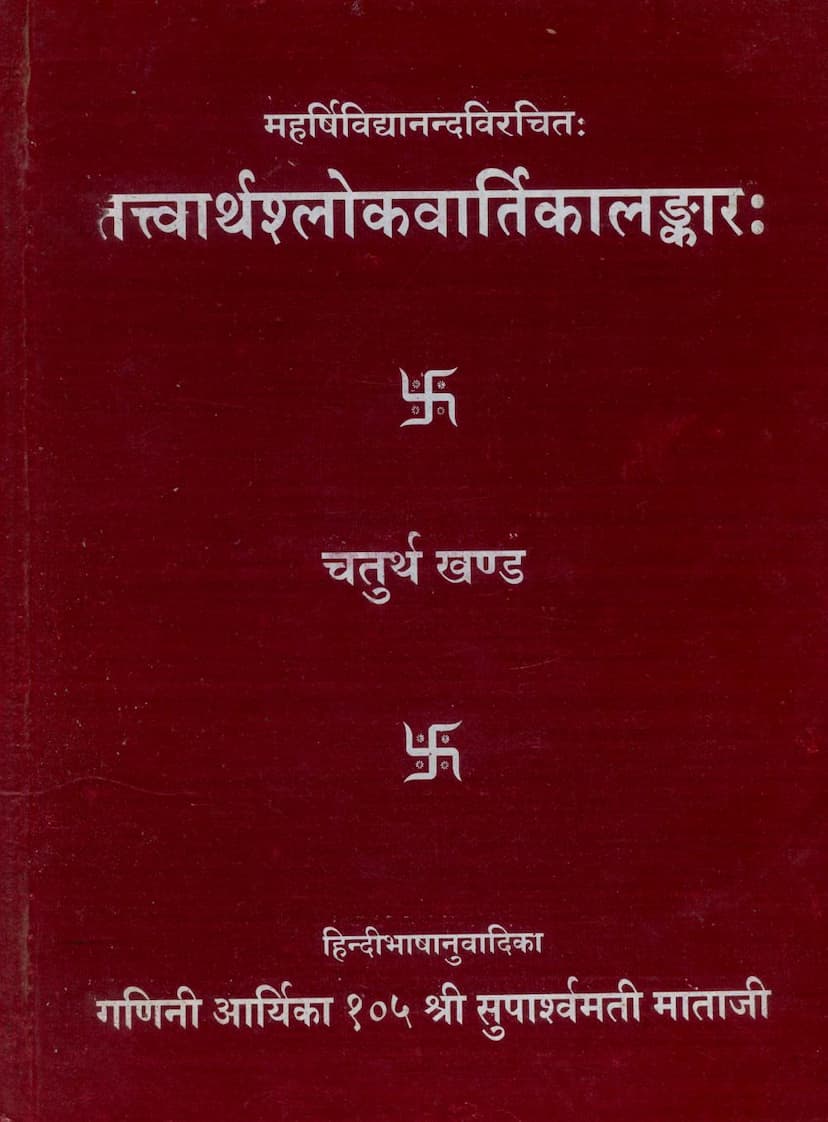Tattvarthashloakvartikalankar Part 04
Added to library: September 2, 2025

Summary
Here's a comprehensive summary of the Jain text "Tattvarthashloakvartikalankar Part 04" by Suparshvamati Mataji, based on the provided text:
Overall Purpose and Context:
This volume, the fourth part of the Tattvarthashloakvartikalankar, is a Hindi translation and commentary on the Tattvarthasutra by Acharya Umashwami, authored by Maharshi Vidyanand Swami. The translation is by Ganini Aryika 105 Shri Suparshvamati Mataji. The work is a profound and detailed exposition of Jain philosophical principles, aiming to elucidate the intricate truths of the Tattvarthasutra from various perspectives. This particular volume focuses on the later sutras of the first chapter.
Key Themes and Content of Part 04:
Part 04 covers the subject matter from the 21st to the 33rd sutra of the first chapter of the Tattvarthasutra. The primary focus is on the nature, classification, and characteristics of different types of knowledge (jnana) and the concept of nayavada (relativity of viewpoints).
Detailed Breakdown of Concepts Discussed:
-
Avadhi Jnana (Extra-sensory Perception): The text begins by explaining bhavapratyayo avadhi (Avadhi knowledge arising from destiny/birth) as applicable to beings in celestial and hellish realms (sutras 21). It clarifies that this knowledge is only considered sammyag-avadhi (right Avadhi) when accompanied by right perception; otherwise, it is vibhanganana (perverted knowledge). It also details ganapratyayo avadhi (Avadhi knowledge arising from innate qualities or effort) in humans and animals, categorizing it into six types: anugami (following), ananugami (non-following), vardhaman (increasing), hiyaman (decreasing), avasthit (stable), and anavasthit (unstable) (sutra 22). The text also notes that pratipat (perishable) and apratipat (imperishable) are included within these six.
-
Manahparyaya Jnana (Telepathic Knowledge): This section explains manahparyaya jnana as having two types: Rujumati (straightforward mind-reading) and Vipulamati (extensive mind-reading) (sutra 23). It describes their respective ranges and the fact that they grasp only a fraction of the karmic substance. The text clarifies that the primary cause of manahparyaya jnana is the soul's kshayopasham (partial destruction and subsidence of obstructing karmas), not the mind itself. It further elaborates on the purity and imperishability (apratipat) of manahparyaya jnana, noting that Vipulamati is purer and higher than Rujumati (sutra 24). Differences between avadhi and manahparyaya are highlighted in terms of purity, area of knowledge (kshetra), the soul of the knower (swami), and the subject matter (vishaya) (sutra 25).
-
Mati and Shrut Jnana (Sensory and Scriptural Knowledge): The text explains that mati and shruta jnana cognize specific modalities or substances but not all modalities or substances exclusively. It refutes the Buddhist concept of vijnanadvaita (consciousness only) by establishing anekanta (multi-sidedness) and asserts that shruta jnana is a good revealer of anekanta-swarup vastu (objects with manifold natures) (sutra 26). It clarifies that Mati and Shruta do not know infinite modalities because the jnana-avaraniya (knowledge-obscuring) karma is not completely destroyed.
-
Kevala Jnana (Omniscience): The text states that Kevala jnana (omniscience) cognizes all substances and all their modalities (sutra 27). It emphasizes that omniscience is not achieved by merely knowing a few important elements but by the inherent nature of soul to know everything. It refutes the arguments of atheists and Mimamsakas to establish the validity of omniscience, noting that it does not depend on senses or occur sequentially.
-
Co-existence of Knowledge: The text addresses the possibility of multiple types of knowledge existing in one soul simultaneously, stating that up to four types of knowledge can occur together, but never five. It also discusses the concept of upayoga (application of consciousness) and how only one upayoga can be active at a time in a soul (sutras 30).
-
Mithya Jnana (Perverted Knowledge): The text delves into the concept of perverted knowledge, explaining how Mati, Shruta, and Avadhi jnana can become perverted (mithya) due to the influence of mithyadarsana (wrong perception) and mithyacara (wrong conduct) (sutra 31). It clarifies that Manahparyaya and Kevala jnana are always correct. It further explains the nature of perverted knowledge as a type of ignorance, often stemming from the inability to distinguish between real (sat) and unreal (asat) and a kind of mental intoxication leading to misapprehension. It critically analyzes various philosophical schools' views on this matter and reaffirms the principles of Syadvada.
-
Nayavada (Theory of Standpoints): The final sutras of this volume introduce the concept of naya, which are partial viewpoints or standpoints from which reality can be understood. It states that knowledge is acquired through pramana (valid cognition) and naya (sutras 32-33). It enumerates the seven nayavada as: Naigama, Sangraha, Vyavahara, Rujusutra, Shabda, Samabhirudha, and Evambhuta. The text then briefly explains the purpose of naya as understanding aspects of reality, with dravyarika (substance-centric) and paryayarika (modality-centric) being the primary divisions. It highlights that nayavada is crucial for understanding the multifaceted nature of reality and refuting extreme absolutist views.
Commentary and Translation Style:
The Hindi translation by Aryika Shri Suparshvamati Mataji is described as mulanaigami (faithful to the original) and shabd-anuvad-bhavanuvad (literal and conceptual translation). The commentary aims to simplify the profound Sanskrit text, making it accessible to seekers of truth.
Appreciation and Acknowledgements:
The publishers and editors express gratitude to Aryika Shri Suparshvamati Mataji for her diligent translation and to Dr. Chetan Prakash Patni for his dedicated editing. The work is presented with the blessings of revered Gurus and is intended to benefit all aspiring souls seeking spiritual knowledge.
In essence, Part 04 of Tattvarthashloakvartikalankar provides an in-depth philosophical exploration of knowledge and understanding within the Jain tradition, meticulously translating and commenting on the foundational Tattvarthasutra.